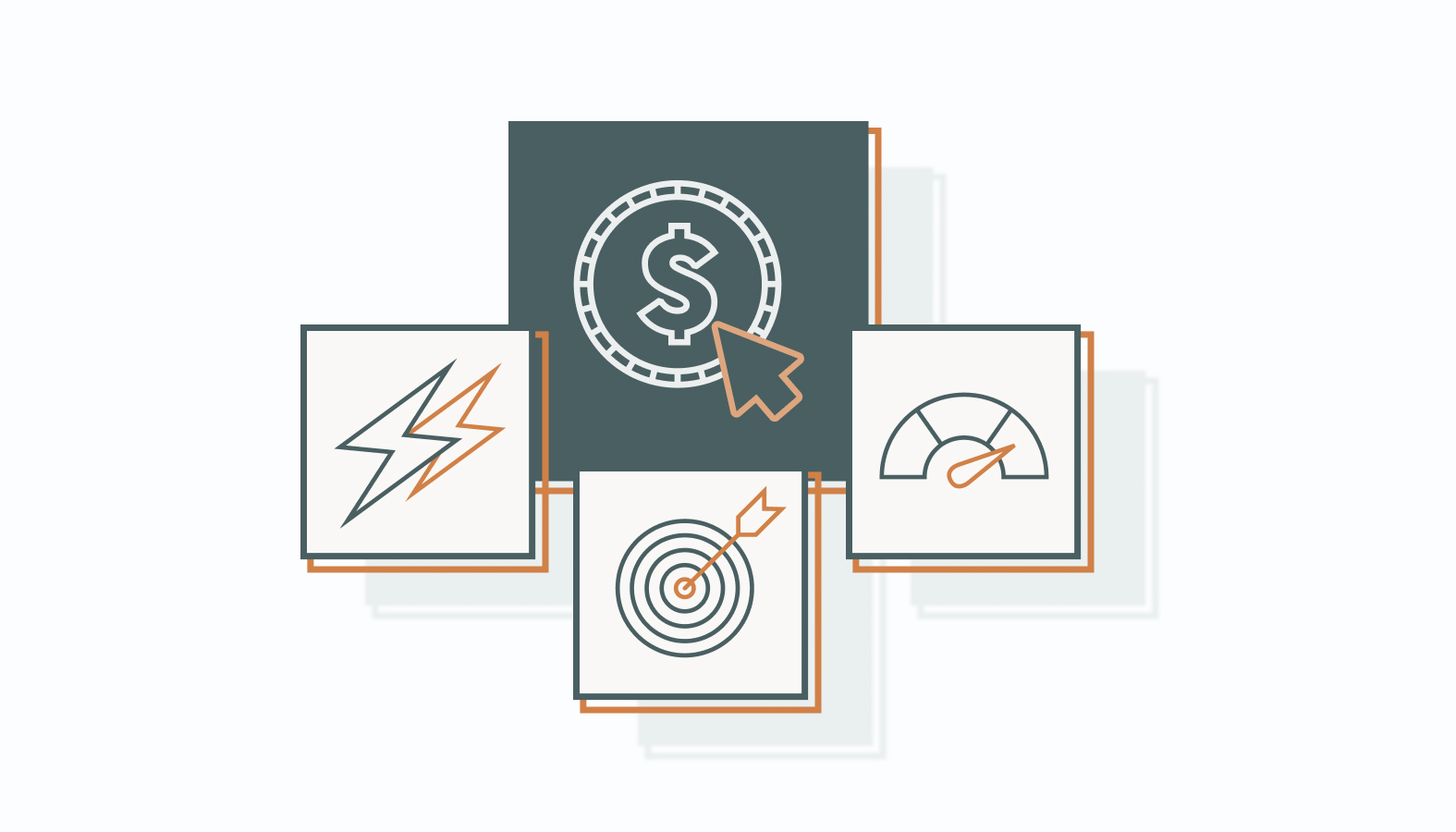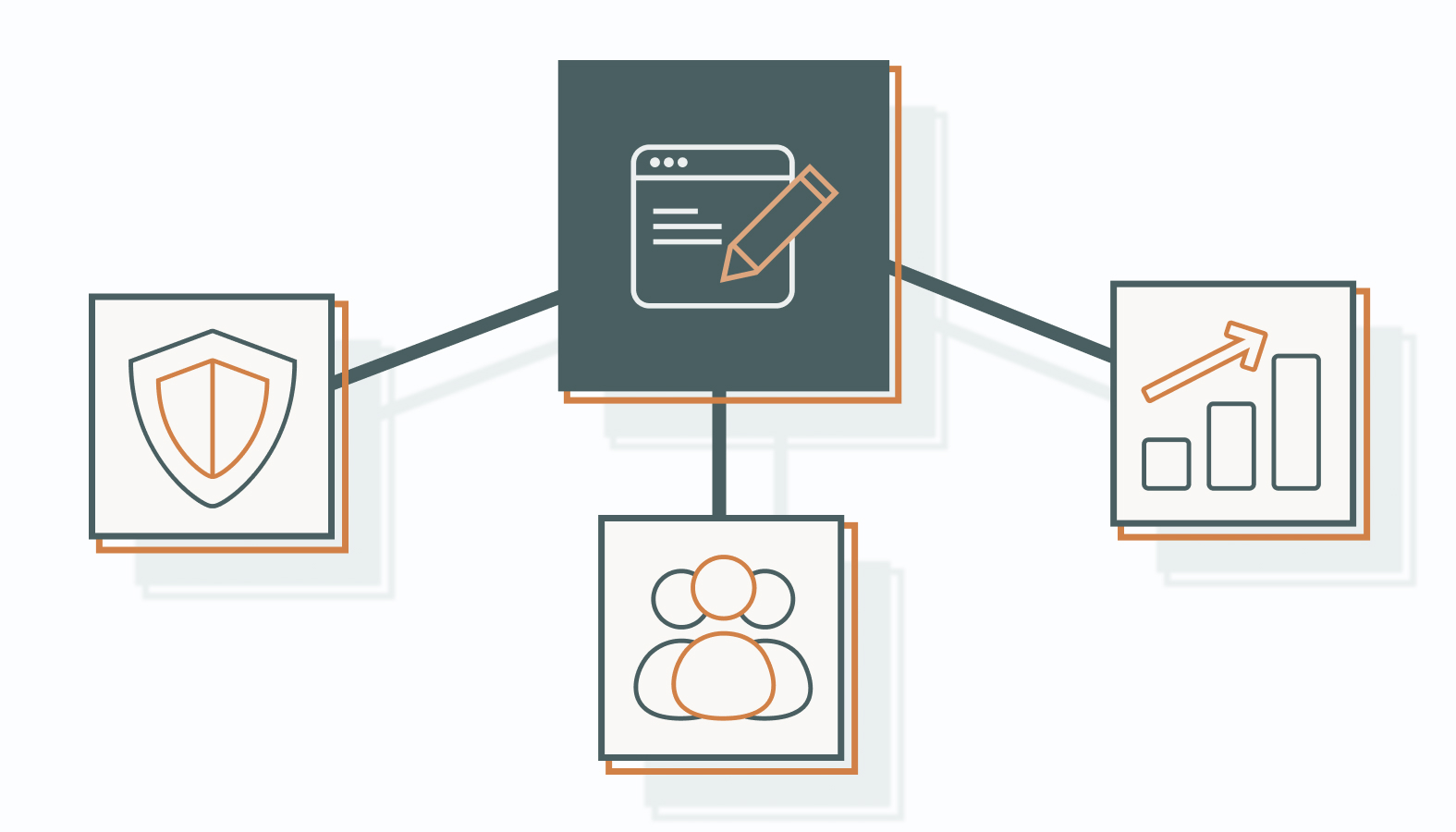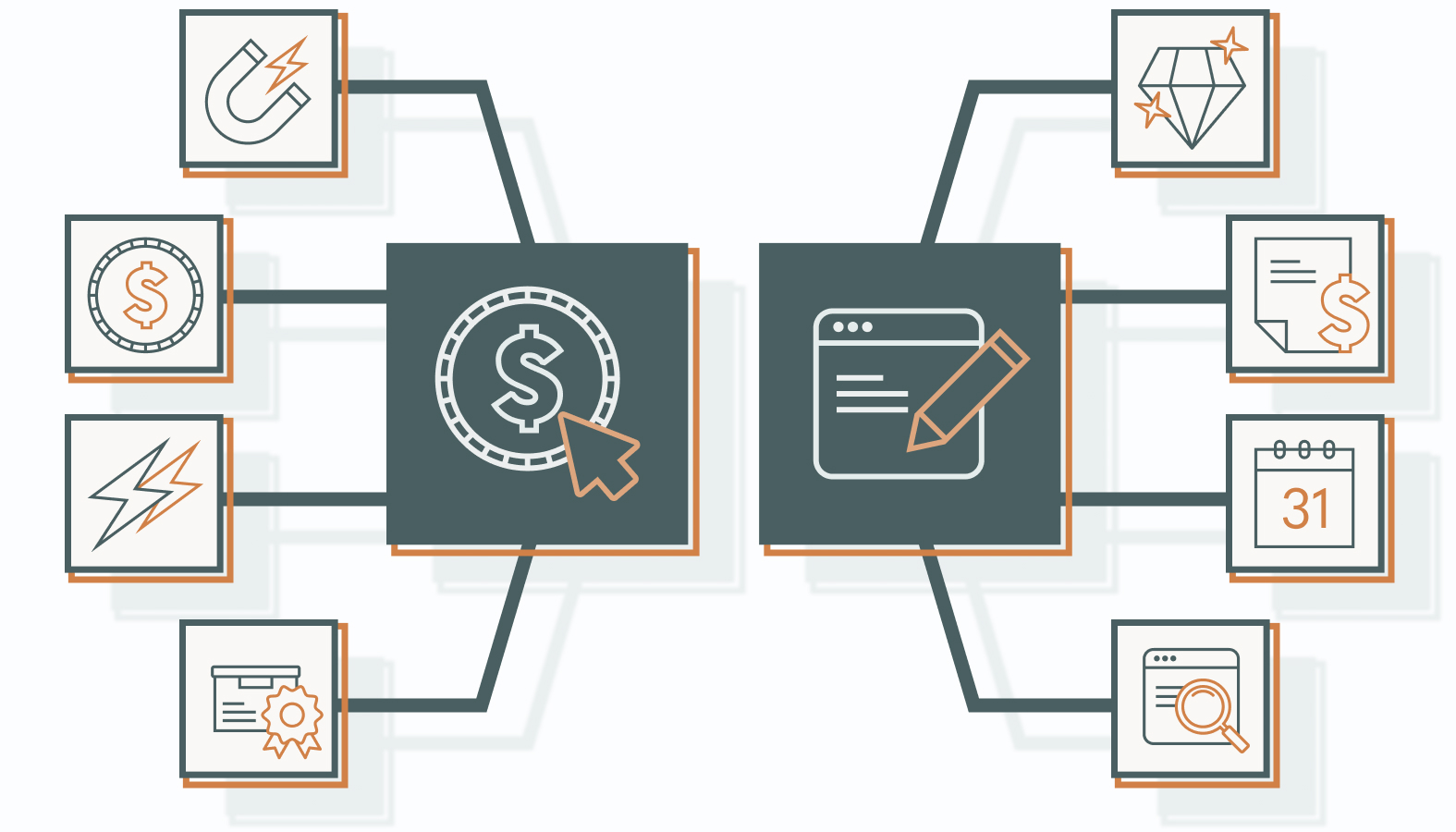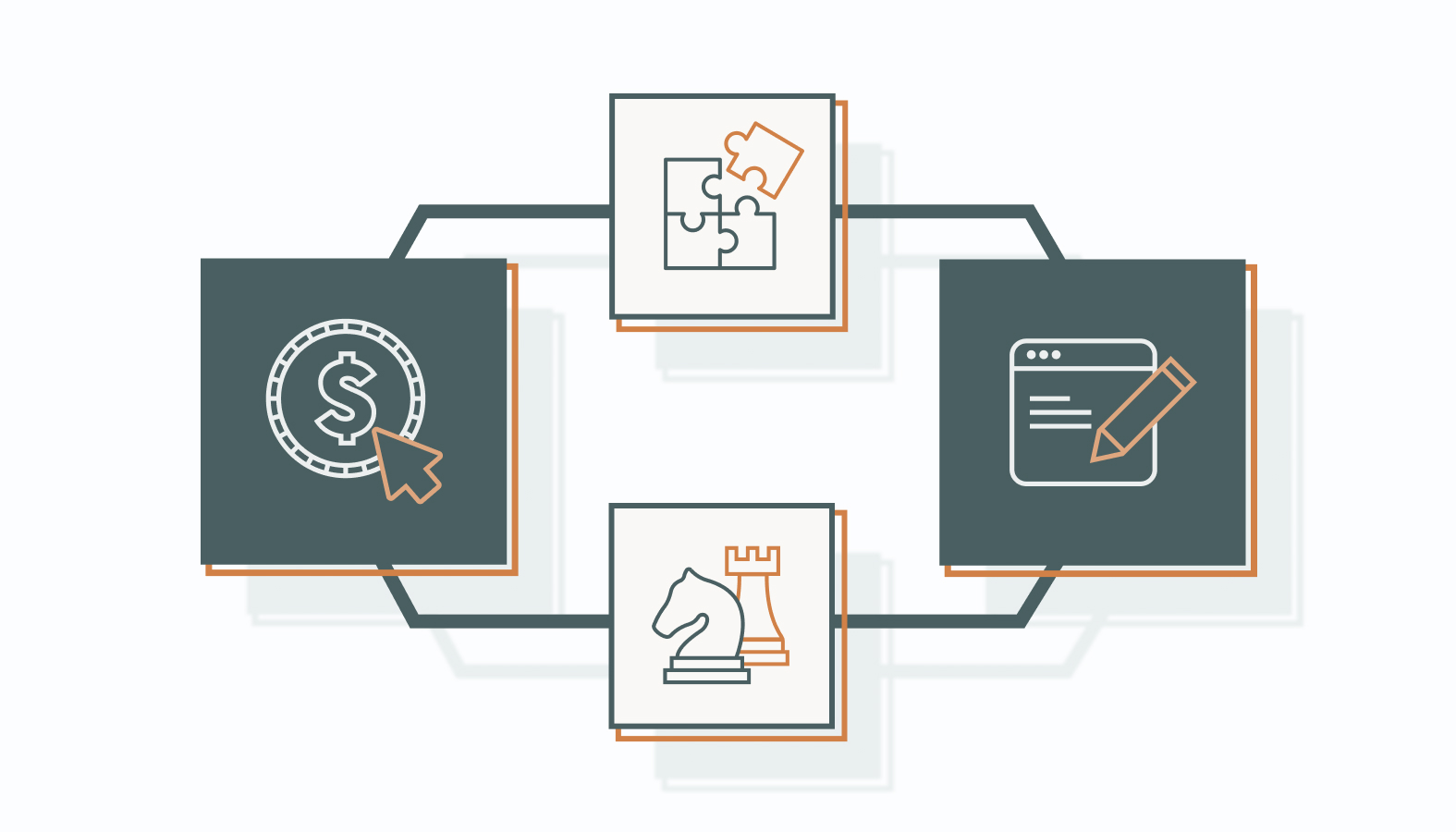Marketing in 2025 is a high-stakes strategy game where PPC delivers instant visibility while content marketing builds lasting authority. One is about speed; the other is about staying power.
The real challenge isn’t picking one over the other but strategically leveraging both to meet business objectives.
This guide breaks down the strengths, trade-offs, and best-use cases of each, so you can make a decision that fuels real growth. First up: PPC.
PPC Advertising: Fast, Targeted, and Built for Results
PPC is a direct line to your ideal audience. Every click puts your brand in front of potential customers, driving traffic and conversions in real-time. When done right, PPC is a fast, strategic way to generate leads, test messaging, and maximize ROI.
PPC Fundamentals
PPC is simple in concept: you pay when someone clicks. But in execution, it’s a high-speed gateway to visibility, skipping the slow climb of organic traffic. Search engines, social platforms, and display networks use this model to put brands in front of the right audience at the right moment.
Winning in PPC relies on structure. Well-organized ad groups refine targeting, increase relevance, and drive better performance.
Then there’s the ad auction, a real-time battleground where bid strategy meets ad quality. The top ads don’t just appear; they earn their spot.
PPC comes in many flavors:
- Search Ads: The classic—text-based ads triggered by keyword searches.
- Display Ads: Eye-catching banners across Google’s Display Network.
- Social Media Ads: Precision-targeted campaigns on platforms like Facebook and LinkedIn.
Understand how each format works, and PPC becomes a high-impact tool, not just a spend.
Advantages of Pay-Per-Click Ads
PPC provides precise audience targeting and immediate performance insights, making it one of the most measurable digital marketing channels.
-
Boosting Website Traffic Quickly
Unlike organic strategies that take time, PPC delivers traffic instantly. The moment your campaign goes live, your ads start pulling in visitors instantly (whether to your website, social page, or a specific landing page.
Perfect for product launches, flash sales, or any campaign where timing is everything, PPC lets businesses immediately place their offerings in front of the right audience.
-
Precision in Audience Targeting
PPC allows hyper-targeting based on demographics, location, and device, ensuring every ad reaches the right audience. PPC lets you dial in on precisely who sees your ads. No wasted spend, no guesswork, just laser-focused reach that drives real conversions and maximizes ROI.
-
Clear Tracking of Investment Returns
With PPC, every click, conversion, and dollar spent is trackable. Tools like Google Analytics make it easy to measure performance, tweak strategy in real-time, and ensure ad spend aligns with business objectives.
No ambiguity, just data-driven results and metrics like conversion rates and cost-per-acquisition (CPA) that you can study and use for future campaigns.
Common Challenges with PPC
While PPC is powerful, it comes with its own set of landmines. Mismanaged PPC drains budgets fast. When optimized, it becomes a high-efficiency revenue driver.
-
Budget Management
Spending without a strategy is a fast track to budget burnout.
Setting daily caps, reallocating funds based on performance, and keeping an eye on cost-per-click (CPC) trends can stretch ad dollars further and keep campaigns running at peak efficiency.
-
Keyword Competition
The most obvious keywords come with a price, literally. High-demand search terms trigger bidding wars that drive up costs.
Smart advertisers go beyond the basics, targeting high-intent, lower-competition long-tail keywords that deliver results without draining the budget.
-
Fatigue and Optimization
Ad fatigue is inevitable. Performance declines when creatives remain unchanged for too long, making regular updates essential.
Refreshing visuals, testing variations, and rotating messaging keep ads from going stale and ensure audiences stay interested.
Best Practices in PPC
Effective PPC requires ongoing optimization. Here’s how to keep campaigns performing at their best:
1) Advanced Keyword Targeting:
Success starts with knowing what your audience is searching for before they even type it.
Competitive analysis, keyword planning tools, and real-time data help uncover opportunities and sharpen targeting for maximum impact.
2) Ad Copy That Converts
PPC ads have seconds to grab attention and drive action. The best copy speaks directly to the audience’s needs, highlights key differentiators, and delivers a crystal-clear call to action.
A/B testing ensures the message that resonates most wins.
3) Data-Driven Campaign Adjustments
Set it and forget it? Not a chance. Regular performance reviews, metric tracking, and strategic pivots keep campaigns optimized and ad spending working smarter, not harder.
Now, let’s talk content marketing.
Content Marketing: Build Trust, Influence, and Lasting Results
Content marketing focuses on how content could position your brand as an authority, engage the right audience, and drive real business growth.
Content Marketing Essentials
Content marketing isn’t about shouting the loudest. It’s about earning attention with substance.
Instead of disrupting audiences with ads, content marketing delivers the insights they’re already searching for, positioning a brand as the trusted expert rather than just another sales pitch.
Content marketing enhances SEO, strengthens audience engagement, and builds brand authority.
Formats vary, but the “engagement with purpose” goal stays the same. For example:
- Blogs sharpen SEO and build authority.
- Videos captivate and simplify complex ideas.
- Infographics transform data into digestible visuals.
- Podcasts create more profound and personal connections.
- eBooks establish expertise with in-depth insights.
When done right, content marketing doesn’t just inform; it influences.
Benefits of Content Marketing
Content marketing turns brands into trusted industry leaders and customers into long-term advocates. When done right, it keeps audiences engaged and businesses thriving.
-
Owning the Spotlight
Great content gets noticed and shared. When done right, it earns organic reach and brand visibility.
Consistently publishing high-quality blogs, videos, and other content strengthens SEO, increases organic visibility, and reduces long-term reliance on paid ads.
-
Building Customer Trust That Sticks
Expertise speaks louder than sales pitches. Delivering useful, well-timed content keeps customers returning and builds relationships beyond transactions.
A trusted brand is one people turn to again and again.
-
From Interest to Action
Content that clicks leads to action.
Whether it’s a blog answering a common question or a video breaking down a complex idea, compelling content keeps audiences engaged and drives them to take the next step.
Content Marketing Obstacles
Content marketing delivers results but comes with a few hurdles that can slow things down. Staying ahead means tackling these challenges head-on with the right mix of strategy, creativity, and adaptability.
-
Keeping Content Fresh and Engaging
Great content isn’t accidental. It relies on fresh ideas and consistent quality. Brainstorming sessions, content calendars, and tapping into customer stories keep things from getting stale. The best content is informative, engaging, and just the right amount of entertaining.
-
Tracking What Works
Great content is only great if it gets results. Metrics like engagement rates, conversions, and ROI help measure success, while tools like Google Analytics and social media insights show what is hitting the mark. The key is making data-driven tweaks that keep content performing at its best.
-
Keeping Up with Shifting Trends
What worked yesterday might not work tomorrow. Consumer interests shift, platforms evolve, and search algorithms change the rules.
Staying ahead means keeping a pulse on market trends, refreshing content regularly, and fine-tuning strategies so the content remains relevant, visible, and effective.
Best Practices in Content Marketing
You’ll need a strategic approach to succeed in content marketing. Here are three proven tips to stay ahead:
1) Building an Effective Content Strategy
Start with clear goals: brand awareness, lead generation, or industry authority. Understand your audience using data insights and craft content that directly addresses their needs. Maintain a content calendar that blends evergreen and trend-driven topics.
Distribution matters as much as creation. Optimize for each platform, whether through organic search, social media, email, or paid ads, ensuring your message reaches the right audience.
2) Mastering SEO Without Compromise
SEO enhances visibility without sacrificing quality. Use relevant keywords naturally, craft compelling meta descriptions, and structure content for readability. High-quality backlinks and internal linking improve search rankings and credibility.
Technical SEO is key—optimize site speed, mobile-friendliness, and Core Web Vitals to boost user experience and conversions.
3) Data-Driven Content Optimization
Analytics reveal what works and where to improve. Track engagement, conversion rates, and audience retention to refine your approach. A/B testing helps optimize headlines, CTAs, and formats. Predictive analytics allows proactive content planning based on trends.
4) Staying Agile in a Changing Landscape
Adapting to changing trends requires regular audits, AI-driven insights, and data-backed content adjustments. Content marketing thrives on a balance of creativity and analytics, driving authority and business results.
PPC vs. Content Marketing: A Strategic Comparison
PPC and content marketing serve distinct purposes but work best together. Knowing their differences helps you maximize their strengths for a well-rounded marketing strategy.
Effectiveness in Achieving Marketing Goals
PPC and content marketing drive results but operate on different timelines and tactics. Understanding their strengths helps you deploy the right strategy at the right time.
- PPC: Generates fast, targeted traffic by instantly putting your brand in front of the right audience. Ideal for promotions, seasonal pushes, and rapid conversions. You pay for immediate visibility, making it a precision tool for short-term wins.
- Content Marketing: Builds authority and trust over time by providing valuable, relevant content. It nurtures relationships, strengthens brand loyalty, and improves organic reach. While the payoff takes longer, the long-term benefits create a lasting impact.
Balancing Cost and ROI: PPC vs. Content Marketing
Success with paid ads and content strategy comes down to knowing how each investment delivers value over time.
- PPC: Runs on a pay-per-click model, meaning every visitor comes at a direct cost. Strategic bidding and keyword targeting determine whether PPC is a high-ROI engine or a money drain. While PPC can require a substantial budget, it delivers fast results when optimized correctly.
- Content Marketing: Lower upfront costs but demands ongoing investment in content creation, distribution, and refinement. The return compounds over time as evergreen content builds authority, drives organic traffic, and strengthens brand presence long after publication.
Speed vs. Sustainability: Choosing the Right Marketing Play
Success in digital marketing depends on understanding when to prioritize rapid results versus long-term gains.
- PPC: Fast to launch, fast to deliver. Campaigns can be deployed in hours, generating traffic almost instantly. This makes it a powerful tool for businesses looking for immediate impact or quick pivots in response to market shifts.
- Content Marketing: A long-term investment. It takes time to create, distribute, and rank, but once established, content keeps working—driving traffic, building authority, and engaging audiences well beyond its initial release.
Integration with Other Marketing Efforts
A well-rounded marketing strategy thrives when every channel works in sync. PPC and content marketing are powerful on their own, but they deliver even greater results when integrated into a cohesive, cross-channel approach.
Here’s how each fits into the bigger picture:
- PPC: Paid search and display ads instantly boost seasonal campaigns and promotions. PPC’s speed and flexibility make it an ideal lever for time-sensitive initiatives. It enhances visibility for content, drives targeted traffic, and captures potential customers at key decision-making moments. When aligned with SEO and organic efforts, it fills the gaps and reinforces messaging across multiple touchpoints.
- Content Marketing: Content is the backbone of long-term digital strategy. It strengthens SEO, fuels social media engagement, and serves as a resource for email marketing campaigns. Well-crafted content builds authority, educates prospects, and nurtures leads throughout the buyer’s journey. Repurposing content across channels ensures consistency and maximizes reach, amplifying the impact of other marketing efforts.
Both PPC and content marketing have their place, but the real power lies in knowing when to accelerate with PPC for quick wins and when to let content marketing compound its value over time.
Brands that balance short-term gains with long-term growth see the best results when these strategies work together. This synergy creates a marketing ecosystem where paid and organic efforts reinforce each other, strengthening brand presence, driving higher conversions, and fueling sustainable growth.
Combining PPC and Content Marketing
Pairing PPC with content marketing creates a powerful, results-driven strategy.
How PPC and Content Marketing Work Together
When synchronized, PPC and content marketing amplify reach, engagement, and conversion rates. PPC delivers immediate traffic to content-rich landing pages, accelerating visibility and giving content the audience it deserves. A well-crafted ad leading to relevant, high-value content improves engagement and nurtures trust, making conversions far more likely.
Content marketing, in turn, powers PPC. High-quality content improves ad relevance, boosting quality scores on platforms like Google Ads. Better quality scores lower cost-per-click, optimize ad placements and enhance overall ad performance. This creates a feedback loop where paid ads drive traffic to content, and strong content strengthens ad efficiency. The result is a marketing strategy that is both high-impact and cost-effective.
Effective Strategies for Merging PPC and Content Marketing Efforts
Want to maximize the power of PPC and content marketing? Here are two key strategies that can take your approach from good to exceptional:
Use Content Insights to Inform PPC Ad Copy Great content reveals what your audience cares about. Use engagement metrics to identify high-performing topics and apply those insights to your PPC campaigns. Align ad messaging with the content users will land on, ensuring consistency from click to conversion. When the journey feels seamless, conversions follow.
Retarget Visitors with PPC Ads Not every visitor converts on the first interaction. Retargeting ads bring them back. Serve PPC ads to users who have engaged with your content but haven’t taken the next step. Remind them why they clicked in the first place, reinforce the value they discovered, and nudge them further down the funnel.
When PPC and content marketing operate together, they create a self-reinforcing cycle of engagement and conversion. It’s not about choosing one over the other—it’s about using both strategically to fuel business growth.
The Winning Formula: PPC + Content Marketing
PPC delivers speed and precision, while content marketing builds lasting trust. Choosing between them isn’t just about preference; it’s about aligning with your business goals.
- If you need rapid visibility and conversions, PPC is your power move.
- If long-term brand authority and organic reach matter most, content marketing lays the foundation.
But the smartest brands don’t choose; they integrate instead. PPC drives immediate traffic to high-value content, increasing engagement and lowering ad costs. Meanwhile, content marketing fuels PPC with stronger ad relevance and better quality scores. Together, they create a marketing engine that balances short-term wins with sustainable growth.
The question shouldn’t be “PPC or content marketing?.” Focus on “How do you leverage both for maximum ROI?”
Get the PPC & Content Marketing Combo Right the First Time
Running PPC without strategy burns budgets fast. Content marketing without direction fades into the noise. The difference between wasted spend and real results? Expertise.
If you’re serious about driving measurable growth—whether through PPC, content marketing, or both—you need a strategy that works from day one. That’s where we come in.
Schedule a candid conversation with one of our experts, and let’s talk about your goals, challenges, and the best path forward.









